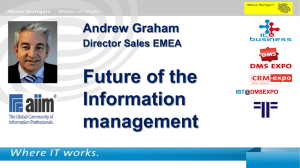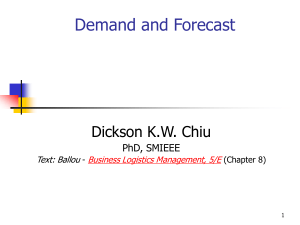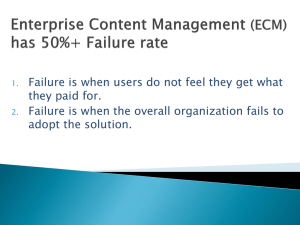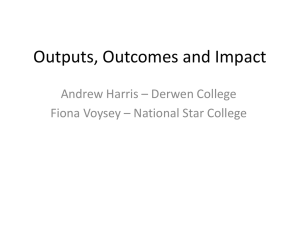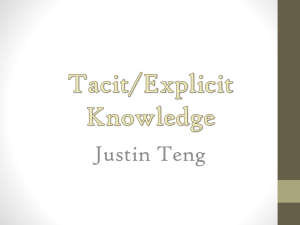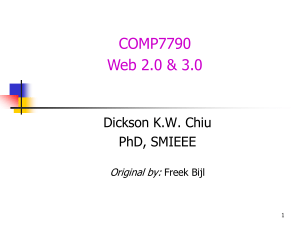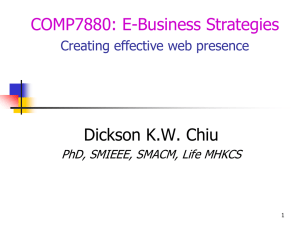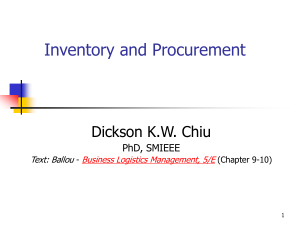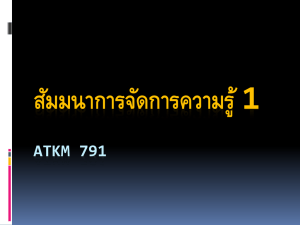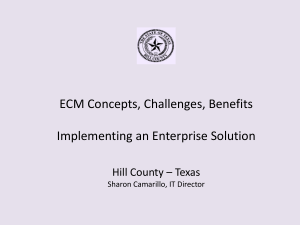Introduction to Knowledge Management
advertisement
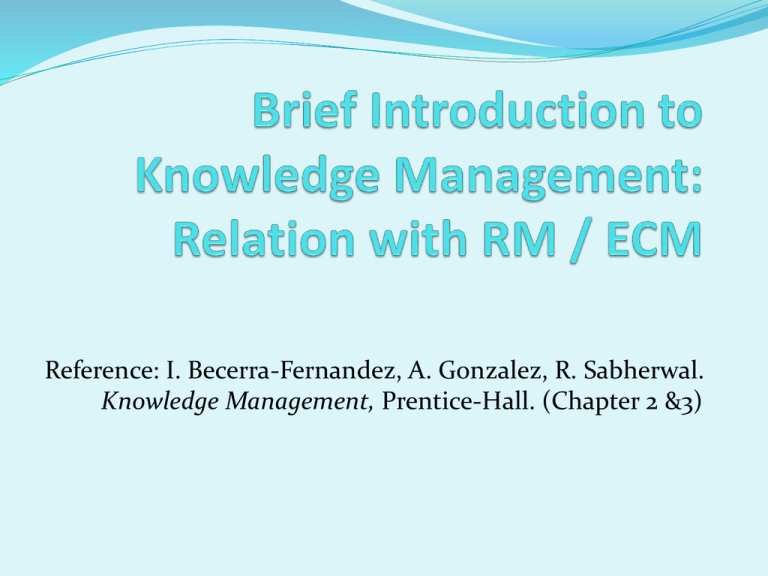
Reference: I. Becerra-Fernandez, A. Gonzalez, R. Sabherwal. Knowledge Management, Prentice-Hall. (Chapter 2 &3) Knowledge Management perform activities involved in discovering, capturing, sharing, and applying knowledge enhance the impact of knowledge on the unit’s goal achievement in cost-effective ways RM / ECM <-> KM Dickson Chiu, 2010 Fall 2 Data –> Information –> Knowledge -> Wisdom Wisdom Knowledge Information Data RM / ECM <-> KM Dickson Chiu, 2010 Fall 3 What is Data? Data comprises facts, observations, or perceptions Data represents raw numbers or assertions Example: A restaurant sales order including two large burgers and two medium-sized vanilla milkshakes. RM / ECM <-> KM Dickson Chiu, 2010 Fall 4 What is Information? Information is processed data Information is a subset of data, only including those data that possess context, relevance, and purpose Information involves manipulation of raw data (using knowledge) – data processing / information processing Information systems must meet organizational / user requirements How does this related to RM / ECM? RM / ECM <-> KM Dickson Chiu, 2010 Fall 5 Information - Example Consider the numbers indicating the daily sales of burgers, vanilla milk-shakes, and other products of a restaurant For the restaurant manager information – he can use such to make decisions concerning pricing and raw material purchases. For the CEO of the restaurant chain data only – he need processing to consolidate such data of all the restaurants for his information. For most customers data – uninteresting things. How does these related to RM / ECM? RM / ECM <-> KM Dickson Chiu, 2010 Fall 6 What is Knowledge? A justified true belief (Nonaka and Takeuchi) It is different from data & information Knowledge is at the highest level in a hierarchy with information at the middle level, and data to be at the lowest level It is the richest, deepest & most valuable of the three Information with direction, i.e., leads to appropriate actions How does this related to RM / ECM? RM / ECM <-> KM Dickson Chiu, 2010 Fall 7 Value of Data, Information, & Knowledge Knowledge (approximation only) Counting HTHTT HHHTH … TTTHT pH = nH/(nH+nT) pT = nT/(nH+nT) EV=pH RH+ pT RT pH = 0.40 pT = 0.60 RH = +$10 RT = -$8 nH = 40 nT = 60 Data EV = -$0.80 Information Value Zero Low Medium RM / ECM <-> KM Dickson Chiu, 2010 Fall High Very High 8 Beyond Knowledge Knowledge – the know how actionable information Wisdom e.g., Increasing the production capacity before X’mas each year to handle the extra sales volume; Knowledge Wisdom – the know why e.g., why there is increasing sales volume just before X’mas? inclination to adjust Information Data How does this related to RM / ECM? RM / ECM <-> KM Dickson Chiu, 2010 Fall 9 Relating Data, Information, Knowledge to Events Knowledge Information System Information Decision Use of Support information System Knowledge Data Decision actions Events RM / ECM <-> KM Dickson Chiu, 2010 Fall 10 Knowledge Classifications Procedural vs Declarative Knowledge Tacit vs Explicit Knowledge General vs Specific Knowledge Technically vs Contextually Specific Knowledge RM / ECM <-> KM Dickson Chiu, 2010 Fall 11 Procedural vs Declarative Knowledge Declarative knowledge (substantive knowledge) focuses on beliefs about relationships among variables e.g., moon is round, Peter get married with Susan round(moon), married(Peter, Susan) Procedural knowledge focuses on beliefs relating sequences of steps or actions to desired (or undesired) outcomes Run a lecture: take attendance, open PPT, … Flowcharts Procedure manuals RM / ECM <-> KM Dickson Chiu, 2010 Fall 12 Tacit vs Explicit Knowledge Tacit (implicit) knowledge includes insights, intuitions, and hunches e.g., don’t dive on PP island when something wrong (tsunami’s coming) Explicit knowledge refers to knowledge that has been expressed into words and numbers e.g., E=mc2 We can convert explicit knowledge to tacit knowledge or vice versa RM / ECM <-> KM Dickson Chiu, 2010 Fall 13 General vs Specific Knowledge General knowledge is possessed by a large number of individuals and can be transferred easily across individuals E.g. operating MS Windows Specific knowledge, or “idiosyncratic knowledge,” is possessed by a very limited number of individuals, and is expensive to transfer E.g. writing programs for MS Windows Question: How about “Installing MS Windows”? RM / ECM <-> KM Dickson Chiu, 2010 Fall 14 Technically vs Contextually Specific Knowledge Technically specific knowledge is deep knowledge in a specific application domain e.g, information technology, financial investment, etc. Contextually specific knowledge refers to the knowledge of particular circumstances of time and place in which work is to be performed E.g., work knowledge in a particular organization RM / ECM <-> KM Dickson Chiu, 2010 Fall 15 Different Types of Knowledge How does this related to RM / ECM? RM / ECM <-> KM Dickson Chiu, 2010 Fall 16 Knowledge Management Processes Discovery • Combination • Socialization Sharing • Socialization • Exchange Application • Direction • Routines Capture • Externalization • Internalization Can you relate this to our main case study? RM / ECM <-> KM Dickson Chiu, 2010 Fall 17 Knowledge Discovery Development of new tacit or explicit knowledge from data and information or from the synthesis of prior knowledge 2 main ways Combination Socialization RM / ECM <-> KM Dickson Chiu, 2010 Fall 18 Knowledge Discovery: Combination The process of synthesizing explicit knowledge - create new, more complex sets of explicit knowledge multiple bodies of explicit knowledge also involve data and information incremental – e.g., “new” proposal radical – e.g., data mining RM / ECM <-> KM Dickson Chiu, 2010 Fall 19 Knowledge Discovery: Socialization The process of synthesis of tacit knowledge across individuals usually through joint activities instead of written or verbal instructions E.g. chatting about how to find a good job Facilitation by technologies Groupware Web 2.0 – forums, chat-room, face-book… RM / ECM <-> KM Dickson Chiu, 2010 Fall 20 Knowledge Capture The process of retrieving either explicit or tacit knowledge that resides within people, artifacts, or organizational entities. Knowledge captured might reside outside the organizational boundaries, including consultants, competitors, customers, suppliers, and prior employers of the organization’s new employees. Externalization vs Internalization RM / ECM <-> KM Dickson Chiu, 2010 Fall 21 Externalization vs Internalization Externalization converting tacit knowledge into explicit forms such as words, concepts, visuals, or figurative language. Internalization conversion of explicit knowledge into tacit knowledge. traditional notion of “learning”. E.g., after reading a book, you learn in your mind Discussion: How does IT help? Can you relate this to our main case study? RM / ECM <-> KM Dickson Chiu, 2010 Fall 22 Knowledge Sharing the process through which explicit or tacit knowledge is communicated to other individuals. effective transfer - so that the recipient of knowledge can understand it well enough for actions. may take place across individuals, groups, departments or organizations. Knowledge is shared (internalized) and not recommendations (no internalization occurs) based on knowledge. Socialization vs Exchange. RM / ECM <-> KM Dickson Chiu, 2010 Fall 23 Knowledge Sharing: Socialization focuses on the sharing of tacit knowledge among individuals, groups, and organizations e.g., talking to a senior year student about how to finish your degree course with minimal amount of effort in the orientation camp. e.g., apprenticeships Note: one may also use socialization to synthesize tacit knowledge for knowledge discovery. RM / ECM <-> KM Dickson Chiu, 2010 Fall 24 Knowledge Sharing: Exchange focuses on the sharing of explicit knowledge. communicate or transfer explicit knowledge between individuals, groups, and organizations. e.g., passing a computer manual from one to another. Discussion: How does IT help? Can you relate this to our main case study? RM / ECM <-> KM Dickson Chiu, 2010 Fall 25 Knowledge Application The process of applying explicit or tacit knowledge to carry out some tasks. The knowledge may have been internalized (exist in one’s mind) or not (e.g., work according to a manual). Direction vs Routines. RM / ECM <-> KM Dickson Chiu, 2010 Fall 26 Direction Individuals possessing the knowledge direct the action of another individual without transferring to that person the knowledge underlying the direction. E.g., calling the help desk to solve your PC problems. Experts’ knowledge embedded in knowledgebase, expert systems and decision support systems. Troubleshooting systems based on the use of technologies like case-based reasoning. RM / ECM <-> KM Dickson Chiu, 2010 Fall 27 Routines involve the utilization of knowledge embedded in procedures, rules, and norms that guide future behavior. economize on communication more than directions because they are embedded in procedures or technologies. e.g., inventory management system for automatic reordering. general information systems and automation helps: Enterprise resource planning systems Management information systems … Discussion: How does IT help? Can you relate this to our main case study? RM / ECM <-> KM Dickson Chiu, 2010 Fall 28 KM Solutions (Summary) Knowledge Discovery Knowledge Capture Knowledge Sharing Knowledge Application KM Processes Combination Socialization KM Systems Knowledge Discovery Systems KM Mechanisms KM Infrastructure Internalization Externalization Knowledge Capture Systems Analogies and metaphors Brainstorming retreats On-the-job training Face-to-face meetings Apprenticeships Employee rotation Learning by observation …. Organization Culture Organization Structure Exchange Direction Knowledge Sharing Systems Knowledge Application Systems Decision support systems Web-based discussion groups Repositories of best practices Artificial intelligence systems Case-based reasoning Groupware Web pages … IT Infrastructure RM / ECM <-> KM Dickson Chiu, 2010 Fall Common Knowledge Routines KM Technologies Physical Environment 29
